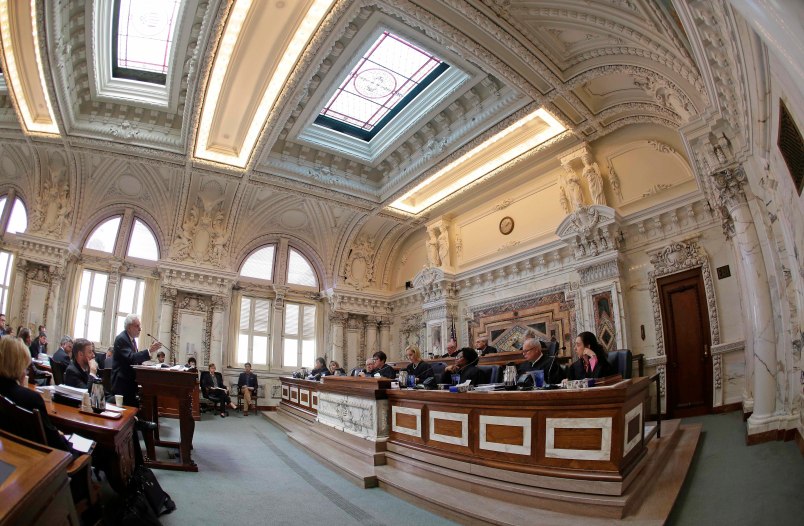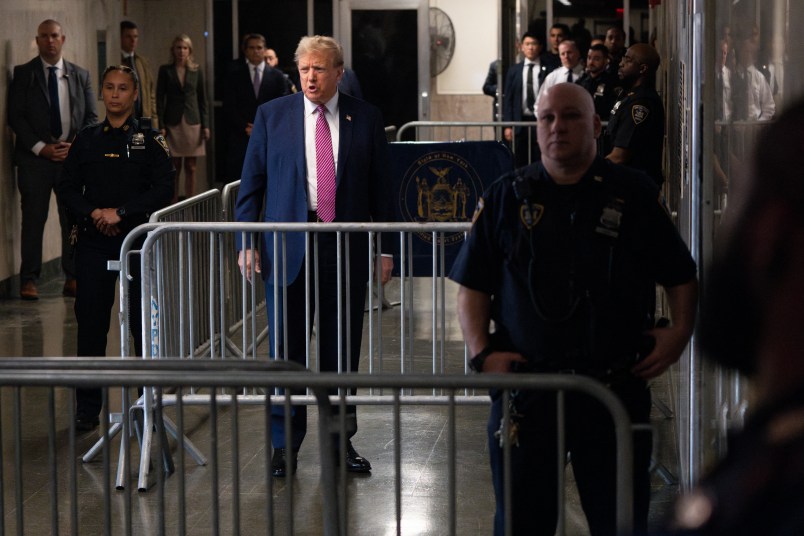WASHINGTON (AP) — Senate Republicans are on the verge of filling the nation’s longest appellate court vacancy and in the process softening a tool the GOP successfully employed to block several of President Barack Obama’s nominees.
The Senate gives lawmakers a chance to weigh in on a judicial nominee from their home state by submitting a blue-colored form called the “blue slip.” A positive blue slip signals the Senate to move forward with the nomination process. A negative blue slip, or withholding it altogether, signals a senator’s objection and almost always stalls the nomination.
Until this year, it had been nearly three decades since the Senate confirmed a judge without two positive blue slips. The likely confirmation Thursday of Milwaukee attorney Michael Brennan to fill an opening on the 7th U.S. Circuit Court of Appeals in Chicago will mark the second time it has happened this year. Sen. Tammy Baldwin, D-Wis., declined to return her blue slip.
The move to go ahead with a hearing for Brennan and a vote on the floor has Democrats crying foul, but as a procedural vote showed Wednesday, that’s about all they can do. The Senate voted along party lines to limit debate on Brennan’s confirmation, 49-47.
“I’d admonish my friends on the other side of the aisle, this is a very dangerous road you’re treading,” said Senate Minority Leader Chuck Schumer, D-N.Y. “As everyone knows, the winds of political change blow swiftly in America. The minority one day is the majority the next.”
The warning was reminiscent of the one that Republican Sen. Mitch McConnell issued when Democrats changed the rules to lower the threshold necessary to end a filibuster for district and circuit court judges. Under the change, the Senate can cut off debate with a simple majority rather than 60 votes.
At the time, the Kentucky Republican said, “You’ll regret this, and you may regret this a lot sooner than you think.”
He was certainly correct. Fast forward to Wednesday, when Sen. Chuck Grassley of Iowa, the Republican chairman of the Senate Judiciary Committee, said Democrats’ complaints were based on an incorrect understanding of the blue slip’s history.
“The blue slip courtesy is just that — a courtesy,” Grassley said.
He said past chairmen of the committee had rarely used negative or unreturned blue slips as unilateral vetoes. The most recent exception was Democratic Sen. Patrick Leahy of Vermont, who was chairman during the first six years of Obama’s presidency.
“That was his prerogative,” Grassley said.
Grassley said that under his tenure, the blue slip will be used to ensure the president consults with home state senators, but not as a veto for appellate court nominees. He said he was satisfied in Brennan’s case that the White House consulted with both of Wisconsin’s senators before the president nominated him.
Republicans have made it a top priority to confirm the president’s nominees, particularly those who will serve on federal appeals courts. It’s a top issue with social conservatives leading into this year’s midterm elections. With Democrats slow-walking many of Trump’s nominees, McConnell said last October that the blue slip process should not be used to “blackball” nominees.
The judicial vacancy Brennan would fill has been open since January 2010.
For Democrats, it was particularly galling that Sen. Ron Johnson, R-Wis., has used his blue slip to object to Obama nominee Victoria Nourse to serve on the 7th Circuit. She eventually withdrew from consideration.
“How is Sen. Baldwin’s right to consult on judges for her state any less important than Sen. Johnson’s?” Schumer said. “It’s mind-bending hypocrisy. It’s an appalling double standard.”
Johnson said more than one million of the state’s residents had voted for him, and he had no role whatsoever in the nomination of Nourse “so I decided not to return the blue slip.”
He said he does not believe the blue slip should be used as an absolute veto, though.
“The blue slip from my standpoint should primarily be used just as the advice and consent of one senator expressing an opinion on a judge from their state,” Johnson said.
Johnson noted that he did return a blue slip for a subsequent Obama nominee to the 7th Circuit, Donald Schott.
However, there was strong resistance from Republicans in going forward with any Obama’s nominees during his final year in office. Just 11 federal judges won confirmation that year.
A final vote on Brennan’s nomination was expected at noon Thursday. McConnell teed up votes for six appellate court nominees this week. So far, the Senate has confirmed 34 of Trump’s judicial nominees.









